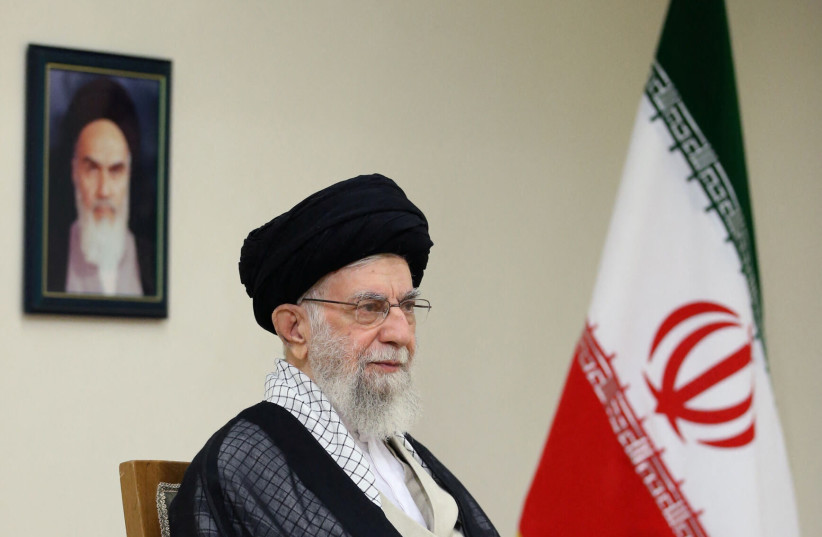The Baha’i community in Iran, the country’s largest religious minority, is suffering escalated persecution in the aftermath of the arrest of several members, accused by the government of spying for Israel.
For more stories from The Media Line go to themedialine.org
In the village of Roushankouh, in Mazandaran Province on Tuesday, about 200 Iranian agents destroyed six homes, confiscated over 20 hectares (50 acres) of land, and arrested more than 100 Baha’is, the Bahá’í World News Service reported, added that this followed weeks of intensifying persecution.
Diane Ala’i, the representative of the Baha’i International Community to the United Nations in Geneva, urged the international community to intervene.
“Given the Iranian government policy documents persecuting Baha’is, the international community must act immediately before it is too late,” she said.

Dr. Ariane Sabet, deputy secretary general of the Baha’i International Community, stressed that the Iranian persecution is nothing new.
“For the past 44 years, there have been accusations about the Baha’is spying for Israel or other foreign powers. There has never been any proof of that,” she told The Media Line.
She added that the character of the persecution has changed over time.
In the early days of the Islamic Republic, the Baha’i community experienced many killings and executions. Later, the mistreatment became more of a silent persecution that includes economic strangulation, exclusion from higher education, demoralization, and banishment of institution officials, Sabet explained.
“There is a pattern of systematic persecution, there’s a plan for persecution that has been both formalized in government documents of the Iranian government and also been felt by the Baha’i community,” she said, adding that lately, the level of persecution has increased and has become more open.
The number of incidents, the arrests, the land grab, and the demolition of homes, all show a direction that could be further stepped up, Sabet said. The state-run media is very much in line with this with anti-Baha’i propaganda pieces, disseminating hate speech and incitement to hatred and possible violence.
The Baha’i faith is a monotheistic religion that emerged from Islam in Persia in the 19th century. Its founder, Mírzá Ḥusayn-ʻAlí Núrí, known as Baháʼu'lláh, was imprisoned and then banished from Persia to the Ottoman Empire in 1853. He went through several stages of exile and imprisonment until 1868 when was sent to Acre, in today’s Israel, where he died in 1892. Baha’is recognize him as an additional messenger who appeared after the Prophet Muhammad. Muslims, on the other hand, insist on the finality of Muhammad’s revelation. Iranian law therefore treats Baha’is as heretics and does not recognize their faith as a religion.
Today, there are between 5 million and 8 million Baha’is in the world. The biggest community lives in India. Iran hosts the second-biggest Baha’i community with about 300,000 members.
Ghanem Rafeh, a researcher on Iranian affairs at the Emirates Policy Center in Abu Dhabi, told The Media Line that the recent open persecution of the Baha’i community has to do with the escalating tensions with Israel.
Recently, Israel has carried out numerous high-profile security operations within Iran, said Rafeh, citing a range of alleged Israeli operations on Persian soil from assassinating high-profile officials and scientists, to acts of sabotage.
“Tehran has responded by shaking up their intelligence community and carrying out arrests of alleged Israeli spies,” he said.
The Iranian regime has long accused the Baha’i community of conspiring with Israel and of being “tools of the Zionist regime,” and the latest persecution could be explained within this context of an internal crackdown, he continued.
Sabet believes there might be other reasons for the escalating persecution.
The Iranian government is apparently scapegoating the religious minority to distract attention from the deteriorating situation in the country, she said.
Another possible reason, she added, could emerge from the fact that the Baha’is are perceived as genuinely interested in the well-being of the country and present an attractive alternative to the Islamist values promoted by the regime.
“It could be that maybe the regime is thinking that this way of life and the development of values such as unity, justice, and trustworthiness which the Baha’i tried to model in the country, may be attractive to Iranian citizens at this point,” she said.
Rafeh said that one might assume that with chances of a return to the 2015 Iran nuclear deal dwindling, Iran would be less concerned with international criticism, particularly when it comes to matters the regime considers issues of internal security. However, Iran still deeply cares about its international image, he said.
“The Baha’i community has long been persecuted in Iran and I don’t think the international reaction will be any different this time around, i.e., within the limits of condemnation and sanctions,” Rafeh added.
Sabet explained that as the Baha’i community urges the international community to act, the local community in Iran is using what she called “constructive resilience,” which is thinking on “how do you keep your inner strength in the face of oppression without resorting to means that are oppositional or violent in nature.”
For example, given that the Baha’is are not allowed to study at universities, the Baha’i community has created an alternative open university, the Baháʼí Institute for Higher Education, and raised it to a level of excellence that means it is well accepted by universities around the world.
The Baha’is believe in contributing to their homeland and to the place where they were born and grew up in. That is why, although many have the opportunity to leave, they decide to stay and contribute to Iranian society despite the hardships that the Iranian government inflicts on them.
